学院新闻
《ChinAfrica Magazine》报道语言中心演出的索因卡剧作
2013-02-22
2012年10月31日,应半岛电竞(中国)科技有限公司官网亚非系的邀请,非洲首位诺贝尔文学奖获得者、尼日利亚著名剧作家渥雷•索因卡教授(Wole Soyinka)到访北大并演讲。演讲之后,北大外院语言中心外国戏剧与电影研究所师生们演出了由格雷夫斯教授(Joseph Graves)导演索因卡教授的戏剧作品《狮子和宝石》。之后《ChinAfrica Magazine》刊登了此次演出的详细背景与情况介绍,全文如下:
Artistic Enlightenment
Theater education nurtures young artists on campus
By Zheng Yang
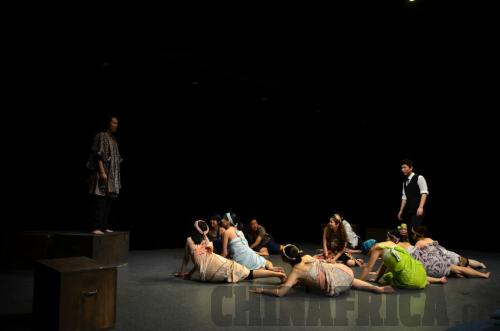
PKU students perform Nigerian author Wole Soyinka, the Lion and the Jewel (COURTESY PHOTOS)
When the Nigerian author Wole Soyinka, the first African winner of the Nobel Prize for literature, visited China in October 2012, he was invited to watch a play, the Lion and the Jewel, one of his masterpieces. He had probably seen hundreds of times before. But this performance was special: the play was performed by Chinese students at Peking University (PKU).
The play is in English. Most of the cast had never been in a play before, but they all did well, confidently reciting their long and poetic lines, singing in an African dialect and dancing an African dance.
According to Joseph Graves, the director of the play and an American professor running the Institute of World Theater and Film at PKU, this is the first time an African play has been performed in China.
Despite the huge cultural gap between China and Nigeria, the actors seemed to have no difficulties understanding the author's thoughts, especially with the help of Femi Osofisan, a famous Nigerian playwright currently teaching at PKU.
"Great works often have things in common," said Li Shi, an actor in the play, who portrayed the "lion," or the chief of the tribe. "The story centers on a clash between tradition and modernization, which can be seen everywhere in China."
According to Li, Nigeria plans to invite the whole cast to perform the play in Nigeria. In fact, developing performing arts skills through theater has become a tradition in PKU. In the last decade, more than 3,000 students have taken part in various English-language stage productions put on by the PKU Institute of World Theater and Film. These productions have been seen by tens of thousands of audience members in China and six other countries.
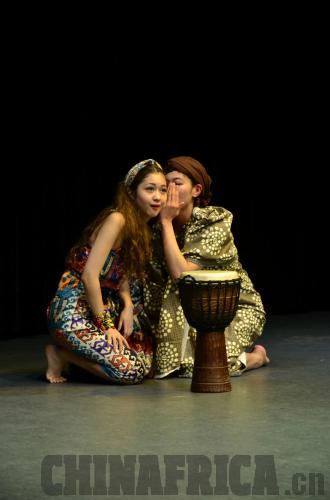
Exploring possibility
Zhao Zhiwen played the hero in the Lion and the Jewel. He is one of the few experienced actors in the play's cast. In 2008, Zhao took Graves' acting class as a college student of Wuhan University. This experience made him decide to study performing arts in Britain, especially Shakespeare's plays. Now back in China, Zhao works at the PKU Institute of World Theater and Film as an actor.
In PKU, more and more young people are embarking on similar paths. The first time Chen Miaojuan decided to get involved in a play, she was just a freshman, an introverted English major who saw acting as a way to improve her character. But after playing different parts in over 10 plays in recent years, Chen, who is currently in the second year of a master's program, is now determined to go abroad to study performing arts after graduation.
Graduates of the top universities in China typically aim to get a good job with a top company, or an important position in the government. Theater seems a far from practical career choice.
"I don't think people should do work that they don't like," said Chen, "I'm young, and I want to try more things."
According to Graves, 35 former students have become professional actors, directors or writers. They would never have considered these career paths were it not for the opportunity they got on campus.
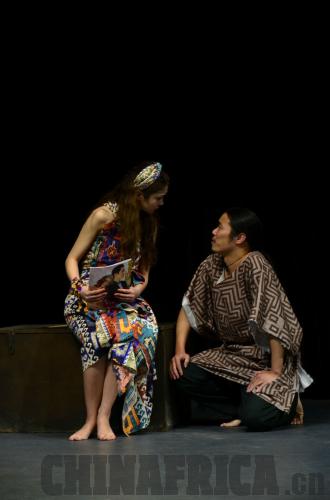
Li Shi saw the significance of artistic endeavors on campus, "University education should not simply be professional training," Li said. "It should help students see something of the diversity of life and the possibilities for their futures. And art does the most to serve that goal."
Older than others, Li encountered the "possibility" of a career in theater seven years after his graduation from PKU in 1999. At the time, he was running a photography business. One day, after watching an English play, he found himself captivated by it.
After that day, Li attended Graves' performing course every day for six weeks. On the last day, he said to Graves, "If you teach me how to act, I will sell my photography business and work with you."
Li had majored in computer science. When he first met Graves, he could barely speak English. Now he is a good actor and works as backstage staff for the institute.
"In the future, I want to become a professional theater producer," Li said.
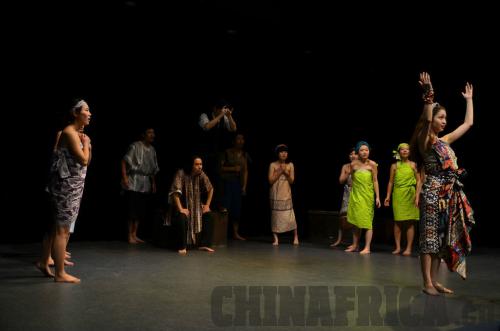
Passing the torch
"I have spent my whole life directing great actors, and I still do that," said Joseph Graves. "But it doesn't seem as challenging or rewarding as seeing new things happen to these young men."
In 2002, Graves came to China to do a Shakespeare play with a Chinese company. While in China, he met Professor Cheng Zhaoxiang, who is a Shakespeare scholar. Cheng invited him to come to conduct a workshop with his students. When they posted a notice online, about 4,000 students came to audition. Most of these students had not even seen a play before.
"It's a deeply moving experience for me," said Graves. "We have Chinese students speaking English as second language, and Shakespeare's English is almost like a third language. But all of them are passionate and intelligent."
Graves discovered that among institutions of higher education in China, there are only a few art departments, and these offer only theory-focused classes. To bring theater to Chinese campuses, Graves and Cheng established the Institute of World Theatre and Film, which produces theatrical productions, promotes and sponsors artistic exchanges between professional theater communities in China and those in other countries, and also facilitates university-level theater education across the country. So far, the institute has employed 75 professional Western actors and 50 professional Chinese actors to work in these productions.
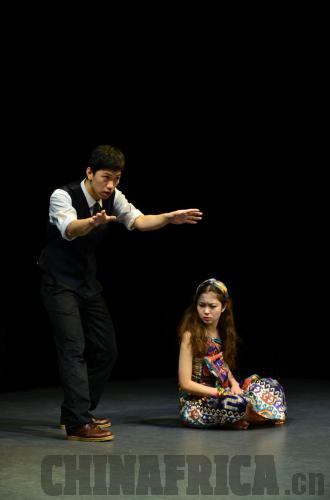
According to Graves, the primary goal of the institute is to promote the arts in Chinese universities. "The element of creativity, like creative thinking or experiencing art, to me seems a hugely important part in someone's education, not to make them an artist, but to stimulate a different way of thinking, a different way of understanding, not necessarily about cultures but about themselves, about spirit and their own ideas," said Graves.
Another goal, Graves said, is to have more young artists go off campus to get more training, and then come back to help other students.
"I'm limited because I can't speak Chinese," said Graves. "So I hope they can continue this job and I believe they will do it better than I did."
This expectation is slowly being fulfilled. Zhao Zhiwen told ChinAfrica that in addition to being a good actor, he hoped to devote himself to performing arts education.



